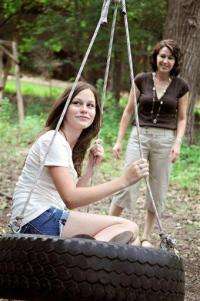Obsessive-compulsive disorder national meeting draws past, present sufferers

(AP) -- Ashley Bystrom was terrified of germs. Jared Kant worried his own thoughts could hurt other people.
Both children overcame the paralyzing fears that accompanied their obsessive-compulsive disorder, success that they feel driven to share with others. That's why neither would miss the Obsessive Compulsive Foundation's annual conference, an event this weekend where the personal connections and support are as important as the speakers and seminars.
"I like meeting other kids and learning about what types of OCD they have, too," said Ashley, now 13. "And I tell them about what I used to have."
Obsessive-compulsive disorder affects about 2.2 million Americans, according to the National Institute of Mental Health. Sufferers have overwhelming thoughts of uncertainty, sometimes leading to repetitive and disruptive behaviors.
People with OCD often behave normally in every aspect of their lives besides the obsession. Symptoms can go ignored or undiagnosed for years, sometimes until they make performing everyday tasks difficult.
There is no cure, but antidepressant medications can help. So can therapy that helps sufferers confront and learn to live with uncertainty.
Dr. Jonathan Grayson, an expert on the disorder, says OCD runs away with the people it afflicts.
"No matter what I choose, I will find a way to question it," Grayson said, describing his patients' struggle with OCD. "I'll keep pursuing uncertainty until I go crazy."
About 1,200 people are expected to attend the conference, which starts Friday. Many attendees are patients and their families.
Seminars will address the different forms of the disorder as well as new research. Other events are aimed toward helping patients cope with their fears.
A mainstay is "virtual camping." Grayson, who has led the camps for more than a decade, conducts exercises geared toward specific fears. In one exercise, germophobic campers place their hands on a trash bin or in garbage. Then, campers hug each other - no hand-washing or sanitizer allowed.
In another exercise, sufferers who fear their own thoughts are told to think the worst - even about killing people - to see if anything happens.
"We're going to work on doing these things on purpose," Grayson said. "We're not trying to prove that they're harmless. Some of the things we do do carry a risk."
On Saturday, younger attendees who struggle with being overly meticulous about their appearance may choose to undergo a "makeover" in a fashion show of sorts - with participants outfitted in misbuttoned shirts, mismatched shoes and funny hairdos.
The 2006 conference was where Ashley's family first found relief from an affliction they initially noticed when she was 6.
Ashley began wearing slippers every time she stepped out of the shower and took them off only after she got into bed. Her cleaning habits gradually became more meticulous: She wouldn't let people into her bedroom, threw clean and folded clothes into the hallway to be washed again and opened dresser drawers with her feet to keep from touching knobs with her hands.
"I was getting more and more worried, because it was at that point where it was taking a really long time and it was affecting our lives," said her mother, Jacquie Bystrom.
Ashley's first therapist didn't specialize in OCD, and it wasn't until the Bystroms attended their first foundation conference that they connected with a therapist who helped her bring her fears under control.
OCD no longer rules Ashley's life, though she continues to take a low dose of medication. She rides her horse almost every day, and has the typical teen's messy room, much to her mother's chagrin.
The Bystroms are attending the conference for a third time.
Kant, 26, who lives in Boston and wrote a book on the disorder, will lead an orientation session for young adults new to the conference.
As an 11-year-old, he feared he had to prevent his mind from being contaminated by negative thoughts. To stay clean, he washed his hands and took showers repeatedly, sometimes spending most of his day in the bathroom.
Kant came to the conference eight years ago looking for support. Though he leads a session now, he says the conference still helps ease his own symptoms.
"It's three days of absolute acceptance," Kant said. "These are three days when nobody will look at you and say, `You are weird.' That's what keeps me coming back."
---
On the Net:
Obsessive Compulsive Foundation: http://www.ocfoundation.org/
©2009 The Associated Press. All rights reserved. This material may not be published, broadcast, rewritten or redistributed.













